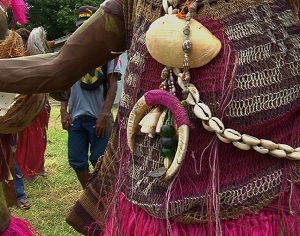By Serah Aupong – EM TV, Port Moresby
Languages are said to be the key to a culture.
A community in Madang fears that more of their local languages will become extinct and, with that, they will lose the vast knowledge the languages contain.
The community is taking steps to revive these languages and hope it will inspire younger generations to maintain their cultural identities.
The Dibaren clan on the North coast of Madang province is looking at traditional ways of conserving their natural environment. Bunam Simporium is a member of the clan who fears that other significant aspects of their community need protection as well.
“Tru tru tokples i lus olgeta,” he says. [Indeed our languages are being lost].
Dibaren is located within a group of 12 clans who originally spoke five main languages. The languages are Yambem, Manep, Waskia, Marsir Kambuar and Kimbu. Of the five, only four remain. The Kimbu language is no longer spoken and is said to have died out.
Of the remaining four, the community is working to strengthen the Manep, Waskia and Masir Kambuar.
“Igat wanwan papa, na ol brata in pas tru wantaim papa i woklo kisim tokples,” Simproium says of their attempts at retaining these languages. [There are men in our community who are trying to retain the languages by sticking close to our elders who know the language].
They have also sought help from outside to guide them to revive their languages.
“Wanpla skul ibin kamap, tokples skul lo Tokain we ol [leaders] i bin go insait lo em. Na mipla raitim ol [tokples] igo daun na mipla tu traim best lo spikim lo kisim bek tingting blo mipla lo ol disla tokples,” he says. [There was a workshop on languages held in Tokain (neighbouring village) where our leaders attended. We have written down our languages and have tried speaking it regularly as well].
Simproium explains that the community also realises that there is an urgency to maintain cultural practices and activities. Josephine Dadi also belongs to the Dibaren clan and says the challenge women, especially mothers, face is that their children are forgetting their culture.
“Ol pikinini blo nau, ol bagarap. Ol ino save lo ol culture na kastom blo mipla.” [Our children don’t know our cultures and traditions and this is not good for them].
Simporium says the knowledge of making traditional accessories for dances is slowly being lost.
“Kain olsem tit dok. Tit dok em wanpla bilas mipla save usim lo passim lo het taim blo wokim singsing tumbuna. Nau mipla ino save lo wanem rop bilong bus bai mipla i usim lo mekim. Nem tasol bai mi save lo kolim, lo wokim mipla ino save.” [For instance, we no longer know what vine to use to make an ornament that is sewn with dogs’ teeth and worn on the head during traditional dances. We know the ornament’s traditional name, but we don’t know how to make it].
Simporium says apart from that, the knowledge about which tree bark to use to make malo, or traditional loin cloth, is also lost. The handful of people who hold this knowledge need to pass them on before it is lost forever.
https://youtube.com/watch?v=we7hbmi9pSE%3Ffeature%3Doembed%26wmode%3Dopaque%26showinfo%3D0%26showsearch%3D0%26rel%3D0


